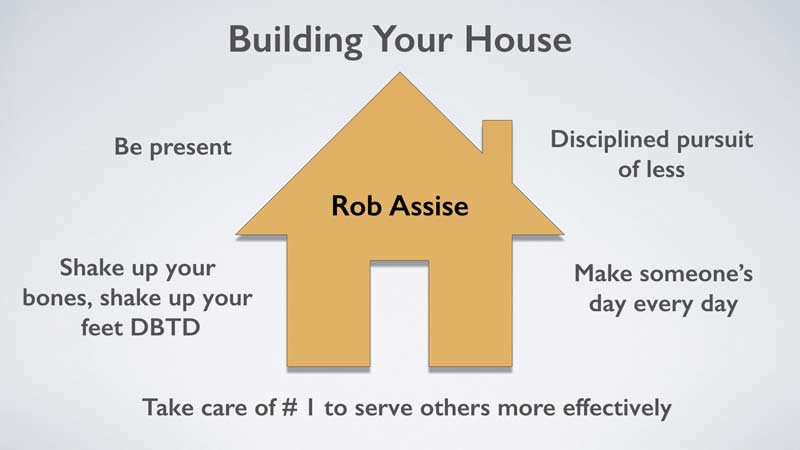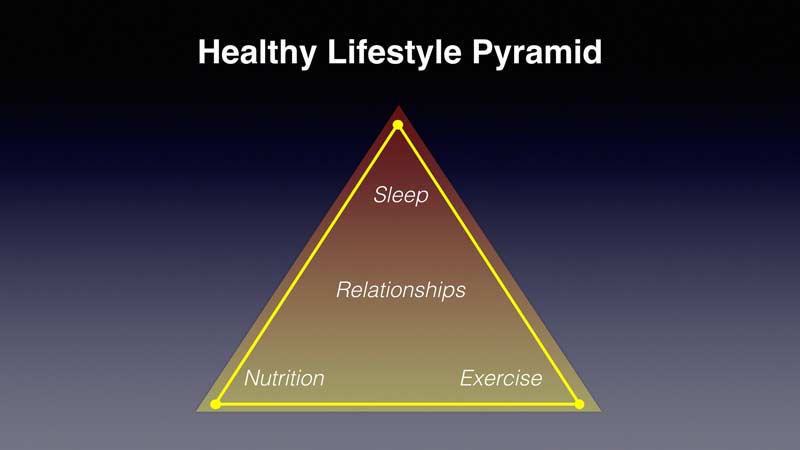
In mid-June, I had the fortune of attending my 9th Track Football Consortium. As always, I left with many takeaways from a lineup full of incredible speakers. The last session I attended was led by the ridiculously successful Steve Jones, head football coach of the Kimberly Papermakers in Wisconsin. Coach Jones opened with his version of a story told in Joshua Medcalf’s Chop Wood, Carry Water: How to Fall in Love with the Process of Becoming Great. In the story, an elite builder named Kota is set to retire but reluctantly agrees to construct one last house. While building, he does not put in the effort he did in previous endeavors. After he finishes, his employer gives him the keys to the house he just built as a retirement gift.
Jones then discussed the importance of being a coach who leads by principles, and he had us build our “House of Principles.” A version of mine is below, and the remainder of this article is a personal reflection on my why.

Take Care of #1 to Serve Others More Effectively
In my professional life, I’m a teacher and a coach. At the core of my choice of profession resides a need to help others. On top of this, I’m a people pleaser and have difficulty saying no to requests. This combination has put me in a bad place numerous times throughout my life. I need a constant reminder that to be at my best while serving others, I must be diligent in providing myself with what I need to thrive.
The four items I identify as a foundation of living a healthy lifestyle are simple: sleep, nutrition, exercise, and relationships. What I find amazing is how they’re interconnected.

When I exercise regularly, I tend to eat healthier and have better sleep quality. Each of these items keeps fueling the next and helps me operate optimally, which lets me be more effective in the relationships I have with others.
When one of these items suffers, a snowball effect typically occurs. I can always tell if I’m getting adequate sleep when I pass a fast food restaurant. If I’m disgusted by the thought of eating the food, I’ve been sleeping well. If I have the urge to stop and buy some of the food, I’m lacking sleep and in survival mode. I’m debating trademarking this as the “Taco Bell Theory.”
Many of us in the teaching and coaching profession find ourselves taking on more than we can handle because of our desire to serve. We should strive to maximize the quantity of service we provide, but it should not come at the expense of the quality of service. There is no doubt the quantity and quality balance is a challenge to manage, but I commonly go back to the question: “How will increasing the quantity impact the quality of those I am currently serving?” If there’s a substantial decrease in quality, finding a way to no is essential and should not harbor guilt.
Make Someone’s Day Every Day
I recently reread Dale Carnegie’s classic, How to Win Friends and Influence People, and decided that one of the areas I could improve upon was giving honest and sincere appreciation to others. Early in my life, my parents instilled the power of handwritten thank you notes, a mode of showing gratitude underutilized in today’s society. The amount of meaning of a handwritten note carries is 100 times the amount of something typed. That being said, a text or email is better than nothing. Carnegie states, “The deepest principle in human nature is the craving to be appreciated.” I put this into action with the following text sent to our handyman who finished our basement:
Recently, our daughter has been sleeping in our bedroom, which has caused me to begin showering in the basement so I don’t wake her up. First, I love the shower! Second, having the space in the basement gave me a place to work out in the winter and spring, so I have been waking up 30 minutes early and exercising every morning. Since I go down there to shower, I don’t have an excuse not to do something active beforehand. The result—I haven’t felt this good in years! It may sound corny, but the basement has transformed my life! The work you do matters!
His response:
Thank you so much for sending this, it made my week! Not corny at all, it is very much appreciated. It is great to know my clients/friends are happy after a project.
It took me less than two minutes to send the note, and I made someone’s week. Do you have two minutes to spare? Be sure to find two minutes and continuously encourage those you interact with to pay forward the kindness you show them. Our world needs it.
The Disciplined Pursuit of Less
No matter what stage of life we’re in, we are always busy. I’ve rarely had a conversation with an adult where he or she says, “Rob, I got to tell you, I just have nothing going on in my life. I just can’t fill all the time I have.” Before I was married, I thought I was busy. I wasn’t. Before I had children, I thought I was busy. I wasn’t. I may have viewed myself as incredibly busy in my early 20’s, but I somehow found a way to binge watch 24 episodes of the television show 24 in 18 hours. Being busy is not a badge of honor we should wear. Our time on this planet will be filled in some way, which we can look at in this manner:
- Maximize the time spent which aligns with our principles
- Create more time to have the power of choice of what to do with our time
Binge-watching a television show is not necessarily a bad thing. It could be a way to recharge your battery after maximizing “principle time” so you can maximize it again in the future.
A few years ago, Tony Holler encouraged me to read Greg McKeown’s Essentialism: The Disciplined Pursuit of Less, and I find myself revisiting it often. According to McKeown, “Essentialism is about making the wisest possible investment of your time and energy in order to operate at your highest point of contribution by doing only what is essential.”
Kill multiple birds with one stone if you can and enhance what you choose to do with your time to the greatest extent possible, says @HFJumps. Share on XWhat this means to me is finding a way to kill multiple birds with one stone as much as possible while enhancing what I choose to do with my time to the greatest extent possible. The Healthy Lifestyle Pyramid is an easy example to revisit. When I improve in one area, one or more areas tend to improve, which results in better use of time. These are some of the questions I ask myself to enhance each component:
- What can I do to improve sleep quality and quantity?
- Given minimal time, what type of exercise gives the biggest bang for the buck?
- How can I work more vegetables into my diet?
- What can I do to improve my relationships with those who are important to me?
Asking these simple questions and acting upon them has enhanced my quality of life substantially. I also know that I’m no more than a work in progress. When I falter, a great reminder is the following from Bruce Lee, “It is not daily increase but daily decrease; hack away the unessential.”
Be Present
In a world where all are connected, it’s easy to lose sight of what’s in front of us. Instead of being in the moment, it’s become more important for people to capture the moment. The headline of the article in which this photo appears is a perfect example. We all want to document our experiences not so we can look back at them, but so we can show others our significance. My question is this: In this obsession of documenting, what are we missing in the process?
In the book, Go Wild: Free Your Body and Mind From the Afflictions of Civilization, authors John Ratey and Richard Manning tell the story of anthropologist Richard Nelson who does his research by living among those he is studying. One such group was the Koyukon, caribou hunters located in the bitter cold interior of Alaska. The Koyukon live a life which we would probably describe as primitive and unplugged.
After some time with the tribe, Nelson moved to an island in the southeast part of Alaska, which had a different maritime climate from the Koyukon. Nelson invited a few of his Koyukon friends to his new home, and upon their arrival, they initially gave him silence instead of a happy reunion. They were entirely out of their element, and they searched the island taking in the minutest details. After days of silence, they finally spoke to Nelson, describing his home in far greater detail than he could after years of living there. Their ability to be present allowed them to notice items most people gloss over.
Your athletes deserve to have you one hundred percent engaged in them, says @HFJumps. Share on XWith all the distractions present in our world, mindfulness—focusing one’s awareness on the present moment—can be difficult to attain. Like many, the greatest barrier to this for me is technology, specifically my smartphone. The easiest way for me to manage this distraction is to turn it off or put it out of reach. Instead of being consistently tempted to check my phone, I control my access to it and use it in chunks once an hour (or every few hours). I find peace by focusing on what is going on as opposed to what else is going on. I’m also able to address the following truths:
- It’s foolish to expect students to engage in a lesson if I’m modeling behavior that showcases disengagement.
- The athletes I coach deserve me being 100% engaged in their reps.
- My children deserve my full attention while we complete a puzzle.
- My wife is more than worthy of my full attention on date night.
I think substituting “being present” for “culture-building” in the following quote by educator Amy Fast is something we all can practice to increase the number of positive interactions we have with others:
The real work of culture-building is in our genuine and consistent micro-behaviors: eye contact, smiles, head nods, leaning in, listening, and really hearing.
“Shake Up Your Bones, Shake Up Your Feet—DBTD”
During high school and college, one of my favorite music groups was the Dave Matthews Band (DMB). The quote, “Shake Up Your Bones, Shake Up Your Feet—DBTD” is from one of my favorite DMB songs, “Pig.” While I think the entire song is powerful, these lyrics are the ones that speak to me the most. DBTD stands for “Don’t Burn the Day.” Both parts serve as a reminder to live life to the fullest. It is in my nature to be passive and conservative. Taking risks terrifies me, even though my logical side continually tells me risks are necessary for growth.
My wife recently expressed interest in a family Spanish immersion program next summer. Little does she know that she caught me at a good time for this proposition. I had just formed my House of Principles, and telling her no would be going against this particular principle. Even though the immersion program is well outside of my comfort zone, I’m excited about making it a reality.
This principle also applies to my productivity. In general, it can be challenging for me to start a task, but once I get going, I’m incredibly productive. In Christian Thibaudeau’s Neurotyping System, I’m a type 2A, which means I have low adrenaline levels but am extremely sensitive to it. Therefore, I have significant motivation issues with tasks in which I have minimal interest. When I face such a scenario, I raise my adrenaline by telling myself I have an opportunity to practice essentialism and being present (two of my other principles). And I reward myself when the grunt work is completed (type 2’s are reward-driven).
At the core of “shake up your bones, shake up your feet” is identifying my why. Whether I’m making decisions as a son, brother, husband, father, teacher, or coach, clearly understanding the reasons for doing something makes the initial motivation less of an issue. It also makes this principle easier to adhere to. If you don’t know your why, why are you wasting your time doing it?
Why I Write
I’ve been asked this a few times, and the first response I always give is because I’m selfish. Writing allows me to reflect and sort out my thoughts at a particular moment in time. It creates something permanent I can go back to (and edit if needed, as I hope to be perpetually evolving). Creating this piece was important for my personal development—remember, I’m selfish. I now have my own House of Principles and written rationale to refer back to whenever I need a reminder, which will happen because I regularly fail to adhere to my principles. And it will be much easier for me to re-aim since I have a target.
Also, through the process of sharing, I hope to address the other reasons I write: to get people to think (one of the main goals of any teacher) and to provide information which can help those who read. I hope my personal reflection sparks a desire to build your own house.
Since you’re here…
…we have a small favor to ask. More people are reading SimpliFaster than ever, and each week we bring you compelling content from coaches, sport scientists, and physiotherapists who are devoted to building better athletes. Please take a moment to share the articles on social media, engage the authors with questions and comments below, and link to articles when appropriate if you have a blog or participate on forums of related topics. — SF


Thank you for your latest article!
I took time this Monday morning to read & contemplate “ building my house”
I so appreciate your words – it made a difference in my life which then makes a difference in others!
Passing it forward
Have a great day!!!
Maura,
Thank you for taking the time to read and reach out. It made my day 🙂 !
Rob
Build Your House: How to Be a Coach Who Leads by Principles” – This title is both inspiring and thought-provoking! Coaching is not just about guiding others toward success but also about embodying principles and values that foster growth, integrity, and authenticity. I’m intrigued to learn more about how principles-based leadership can positively impact coaching practices and empower individuals to reach their full potential